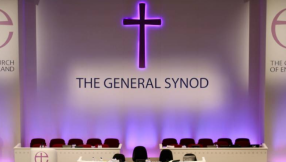
(CP) In an industry notorious for its fleeting fame and rapid changes, few bands have withstood the test of time quite like the Newsboys — and keyboardist Jeff Frankenstein believes the Christian music band's longevity is due to their commitment to biblical truth.
"I think our longevity is a testament to our hearts and where we are as people, because it's very uncommon in any genre that a band would stay together for over 30 years," Frankenstein told The Christian Post.
"I think that one of the cool things about Christian music, as opposed to pop music, is that we all know deep down that music affects people and has a purpose and God gave us that gift. In a pop music situation where everything's about you and your career, you can see why those things flame out so quickly, because they're just based around either people's egos or just selfishness. In this situation, we all have a common purpose where we know that music can really change people, because we've seen it happen."
Frankenstein has been with the band from its inception 31 years ago, along with drummer Duncan Phillips and guitarist Jody Davis. DC Talk's Michael Tait joined as lead singer over 15 years ago, and more recently, Adam Agee, formerly of Audio Adrenaline and Stellar Kart, joined the group.
"We're one of those bands that is in a rare situation where we have a black lead singer and then we're white guys, and we have people from Australia and people that work in our office from other countries. We're a very kind of multicultural band," Frankenstein said.
Known for hits like "We Believe," "God's Not Dead" and "Shine," the Newsboys has earned four Grammy nominations, two American Music Award nods and multiple Gospel Music Association Dove awards. Last month, they released their latest album, Worldwide Revival Part I, with part II coming in October.
Rooted in biblical principles and steeped in prayer, Frankenstein said the album is both a reflection of the band's enduring faith and a response to the anxieties of today.
"We really wanted to take our time with this one," he says, recalling the two-year journey that led to its completion. "There have been so many times throughout our careers where we felt the pressure of deadlines — always trying to get to the next thing. But this time, we wanted every single song to really speak out and have a poignant message."
"When you travel as much as we do, you get a different view of culture and people," he added. "We stare into the faces of thousands of people almost every night, and you get the sense that people don't always feel like the world is headed in a great direction ... everything is grabbing for our attention, but is it really a great thing for us as a whole, as people, as Christians? That's the question we kept coming back to."
It was this question that ultimately shaped the album's thematic core. "The album is a prayer," Frankenstein said. "It's a prayer to God to start something in this world. People are hungry. They're desperate for truth. They're crying out for something — they don't know what it is, but they feel it. And I think trying to put that feeling into music is kind of what this album is about."
The Newsboys' latest single from the album, "In God We Trust," is featured in the newest "God's Not Dead" film, hitting theaters Sept. 12. The latest installment of the series — originally inspired by the Newsboys' 2011 song — stars Dean Cain and David A.R. White and centers on contemporary issues related to freedom of speech, religious liberties and the role of faith in public life.
According to Frankenstein, the song is a reminder of faith's enduring strength, especially in a world filled with uncertainty. The song includes the lyrics "Some will trust in chariots of war/ Some believe in nothing anymore/ 'Cause kingdoms rise and kingdoms fall/ But there is One who stands above them all."
"Our music is a reflection of our own spiritual journeys," says Frankenstein. "Songs like 'In God We Trust' talk about how, as Christians, we see the world differently. We believe in the forces of good and evil, and that God is our only hope."
The artist reflected on the trend of CCM artists from the '90s and early 2000s deconstructing their faith, from Hillsong's Marty Sampson and DC Talk's Kevin Max to Hawk Nelson's Jon Steingard. Worship artist David Crowder previously opened up to CP about his own brief "deconstructive moment" after having a negative "institutional experience" with the Church.
As the son of a pastor, Frankenstein said he's seen both the positive and negative aspects of the Christian faith up close. He attributed some of these departures to negative experiences within the Church.
"My heart personally breaks because I know how deep and meaningful my faith is to me," he said. "I can't imagine a world in which I would want to turn away from that. I'm not speaking directly about friends like John [Steingard] and Kevin [Max], but about anyone who decides to leave the faith."
"I think a lot of it has to do with really bad experiences," he said. "I've been in the Christian music industry for 30 years, and to just say that everything's just squeaky clean and beautiful and wonderful — we live in a pretty broken world. Humans are going to be humans, and sometimes that's an ugly thing to see. People get hurt, bad things happen, and we've seen it in church leadership."
Stressing that deconstruction "isn't just an issue in Christian music," Frankenstein said he tries to approach the issue with compassion rather than judgment. "For me, there's no judgment. I like to hear what they have to say and see how I can improve as a Christian," he said. "It's a gut check for myself, not a judgment against people who've made decisions for themselves."
Frankenstein credited his enduring faith to the positive examples set by his parents and other role models. "I was fortunate to not see hypocrisy in the people I looked up to," he noted. "When Christians do see hypocrisy, they react differently. For me, it's a challenge to assess my own walk with God and to ensure I'm living out what I believe."
Looking ahead, Frankenstein said he's excited to continue sharing the Gospel with audiences, encouraging them to stand firm in the faith despite changing cultural tides.
For the band, maintaining the balance between scriptural soundness and broad appeal has always come easy, he said, adding: "We've always just been ourselves. We don't worry about being too Christian or not Christian enough. We just do what comes from the heart."
"Once you record the songs, they're not really ours anymore — they're our fans'," he says. "It's incredible how many stories we hear from people who say our music has been a soundtrack to their lives. That's what makes it all worth it."













